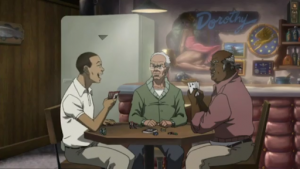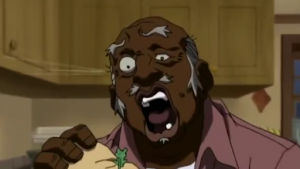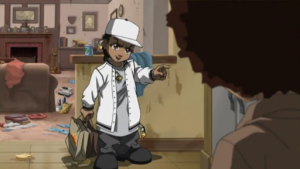44 The Boondocks (2005-2009)
Raising a Ruckus: The Boondocks (2005-2009)
By Diego Mendez
In Season 2, Episode 10 of The Boondocks, we begin by seeing three of the main characters sitting around the table playing cards in a basement. In the early 2000s, there was a call for a boycott of the wine Crystal by the rapper Jay-Z because the owner said “he didn’t want no big nigga lips drinking my fine wine,” according to the character Uncle Ruckus. Uncle Ruckus in response to the statement that there should be a boycott of a product by the black community, went on a politically incorrect rant. I personally found everything uncle ruckus spoke about rather interesting because he mentions the white man no longer having anything nice for themselves because the Black community has taken it over. Along those same lines, all of the subjects mentioned: Polo, Timberland, Mercedes, and Versace, could be arguably better off because of the black community. All of these companies fall in line with the same model Polo by Ralph Lauren followed when they became popular in the NY streetwear scene, which was to take the profit and free publicity but never directly market to the Black community or admit its impact. This causes an entire generation to live having to choose between living under the labels applied to their culture or being outcast and labeled revolutionaries.

My focus is surrounding the side story following Riley and Huey. Following a long string of failed babysitters, we are introduced to Uncle Ruckus a self-hating African American, who claims to have been chosen to babysit because of his extensive knowledge of wild animals, of which a black person is the most savage of them all. Despite all of his wild statements, however, he becomes a failed babysitter and leaves the boys alone to their own devices. What follows is a commentary on how white society sometimes sees young black males. We see the boys face the typical argument against handouts, where they were given a set amount of money by the Man (Granddad) and then Riley who is coded to be a “thug” spends all the money that Huey, being the intellectual black revolutionary with his red star patches, was using to feed them. I decoded this to be a reference to the African American community trying to better itself as others have, comparing this to a struggle faced by Barack Obama who was called a “Food Stamp President” ( Parasocial Politics 154). This highlights that regardless of the societal level a member of the African American society reaches, the welfare, handout loving image persists.

We begin to see how much Uncle Ruckus is coded to be a slave master, by using cattle prods and electric dog collars as tools to use on children, but as I have stated before, he sees black people as animals and savages that need to be controlled. This draws a parallel between the treatment of slaves in the past but modernizes the tool used to dehumanize them, no longer is it whips and chains, but cattle prods and dog collars. All throughout this scene, we hear a dopey tuba as the main accent of the scene, which tells me the creators of the series were aware of the outdated mentality and chose to add some humor to it. We see Ruckus eating a sandwich and making free use of the freeman house, a set of actions that had previously gotten the only successful source of discipline, in the form of a white supernanny, fired. This distinctly shows that there is a disparity between the consequences of the same actions simply due to race. There is also a brief focus afterward on the boys gearing up for a gun battle, a coming together of the revolutionary mentality and the gangster mentality to overthrow what could be decoded as the white culture or, more generally, a common enemy. While briefly working together they achieved their goal of eliminating all their babysitters. I see this as an early call to action, getting rid of superficial differences in the African American community and acknowledging that sometimes the enemy is not external in the form of White culture, but it can be internal in the form of outdated and divisive ideologies perpetuated by the African American population itself.
Power dynamics can be seen all throughout the episode from all the nannies that came in: a teenager who failed and a positive “Big Brothers Big Sisters” style positive black man who also failed. The only person who succeeded in bringing order to the freeman household was an authoritarian white woman, which can be easily be seen as a representation of the idea that black people were better off under the strict guidelines of the white man. Power being taken by force shows up when Uncle Ruckus cries to be saved from the black hooligans who are attacking him, a distinct shift in the power dynamic considering he was earlier threatening to use cattle prods and shock collars to tame the boys. The two young boys resorting to gun violence due to limited positive social associations, which we see as a theme all throughout the episode reminds me of the perpetual concept of the White victim and African American aggressor. Messineo described the situation well when he wrote that “men of color are faced with achieving masculinity [in media representations] through their corporal selves as physical threats (i.e., as an athlete or gang member) as opposed to their intellectual contributions … To be viewed as assertive and aggressive is valued in the culture but comes at the expense of other highly valued qualities …” (Messineo, 2008, 755).
While it might seem that the entire show is nothing but a joke, the creator, Aaron McGruder took it very seriously and is quoted saying that “For three seasons I personally navigated this show through the minefields of controversy. It was not perfect. And it definitely was not quick. But it was always done with a keen sense of duty, history, culture, and love.”(Ezell 112). After the third season, there was a drive from the network to put out more episodes that were not in line with what the creator wanted, and it led to him being absent from the production and the oversight of the creation of the season. While the first 3 seasons of the boondocks are far from subtle in their use of racism, season 4 went off the rails, throwing the N-word around in places that before it would not have been used. Reminding me of the argument over the use of profanity that it should be used less, but used with conviction when it is time to use it. Season 4 did not follow that mentality and as a fan of the show, it made me cringe because something so good was ruined by the Hollywood machine.
An issue with all this could be that it is being so blatant with its use of racism and barely coded themes that it is detrimental to the black community, as it is making a joke of something that has been systemic and incredibly oppressive. Some episodes have been banned or heavily censored on Adult Swim and BET, which leads me to believe the show has touched a nerve among the African American media demographic as well as the white networks like Turner Media, which owns Cartoon Network and Adult Swim. The African American community sometimes wants to put stereotypes behind them, but the characters of Huey and Riley, who embody the black revolutionary and the black gangster mentality, were helping to keep those stereotypes alive. The gun battle between them in this episode is the culmination of the expected actions of the self-destructive young African American male. The intellectual and gangster African American male can both rationalize their action through the duality of an African American males existence: Huey as trying to apply order and discipline by any means necessary to break free of oppression, and Riley as the fiercely independent and sometimes ignorant aggressor who lives by and is consumed by the stereotypes of minority aggression.

The Boondocks is an awesome (not season 4) series with episodes like the hunger strike and home alone. It reminds me of a similar struggle in the community that I grew up in. I used to wear polo and all the standard white brands only to not fit in there and be mocked for whitewashing by my “community”. Like Uncle Ruckus says, white women had been taken over by black men. While I’m not black I have seen that first hand, interracial dating was frowned upon from my end and even more so from the perspective of the parents of the women I was dating back then, who were excited to meet me until they realized that I was not a member of a rich white family. Growing up around fairly wealthy White people showed me how money and status can radicalize one subtly, and just like Huey and Riley, one can end up rationalizing their actions out of fear that a minority could rise up and take over what they have built. Tying in with the fact that all of the issues presented in this episode are typical of low-income family situations but yet they are happening in a rich white environment breaks the illusion that the problem stems purely from their innate mentality. It instead indicates that their environment forces that mentality upon them in order to survive, with some not being as lucky as others.
In conclusion, this episode tackles a lot of issues around being a young African American male, we see that you can take them out of the hood but you can’t take the hood out of them, as seen by their rampant gun violence among the upper class of Woodcrest. The oppressive depiction of the African American community’s willingness to take handouts and then mismanage their funds and remain poor. These only briefly touch upon the struggles with Discrimination, Power, and the fundamental Differences between White and African American societies. Despite all these obstacles we now see the African American culture blooming and flourishing on its own, and becoming a keystone in the mainstream culture. With that being said, we can not forget that culture as a whole has fetishized many aspects of African American culture, willfully ignoring all their troubles and tribulations. Hopefully, as we see more shows and films tackling these issues, unity can be attained in the future.
References
Ezell, Silas Kaine. Humor and Satire on Contemporary Television: Animation and the American Joke. Ashgate, 2016
McGruder, Aaron. The Boondocks. Adult Swim, Cartoon Network. 2010. Atlanta Georgia
Zenor, Jason. Parasocial Politics. Lexington Books, 2014
“Media Portrayals and Black Male Outcomes.” The Opportunity Agenda, www.opportunityagenda.org/explore/resources-publications/media-representations-impact-black-men/media-portrayals

